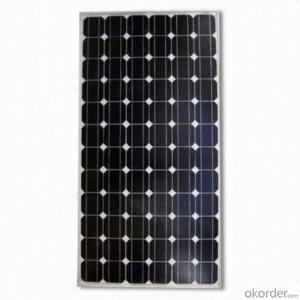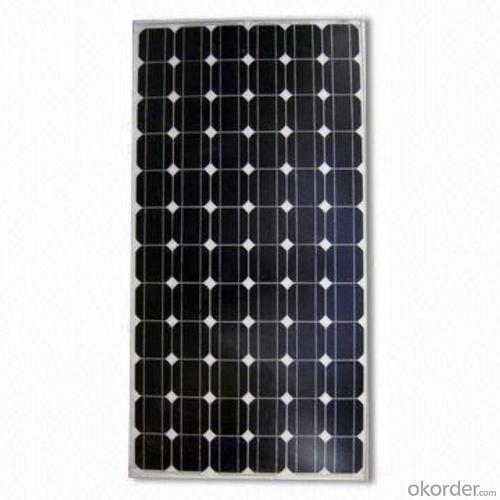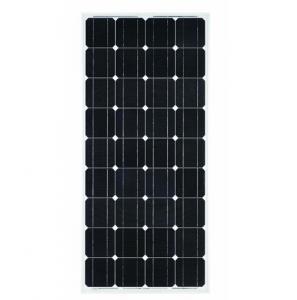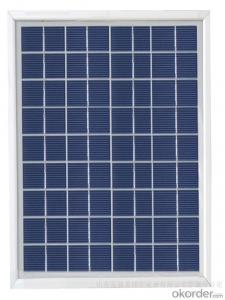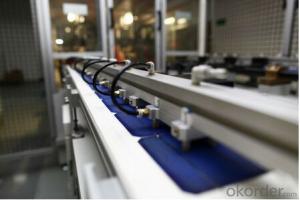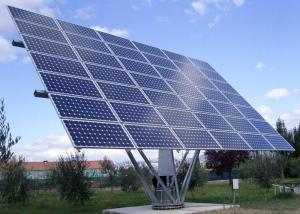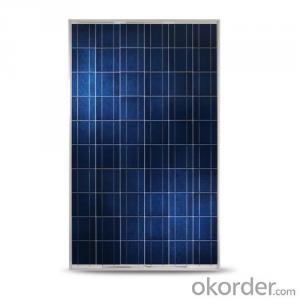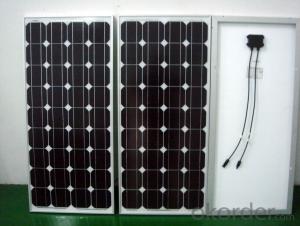Non Roof Solar Panels 250w with TUV IEC MCS CEC IDCOL SONCAP Certificates
- Loading Port:
- Shanghai
- Payment Terms:
- TT OR LC
- Min Order Qty:
- 1000 watt
- Supply Capability:
- 100000000 watt/month
OKorder Service Pledge
OKorder Financial Service
You Might Also Like
- TUV IEC, MCS (UK), CE, CEC (Australia), INMETRO, IDCOL, SONCAP CERTIFIED
- [EU ANTIDUMPING DUTY-FREE]
- PROFESSIONAL SOLAR PANEL MANUFACTURER SINCE 2004
FEATURES
`Long Service Life
`High Efficency Solar Cells
`Special Aluminum Frame Design
`High Transmission,Low Iron Tempered Glass - TUV IEC, MCS (UK), CE, CEC (Australia), INMETRO, IDCOL, SONCAP CERTIFIED
- [EU ANTIDUMPING DUTY-FREE]
- PROFESSIONAL SOLAR PANEL MANUFACTURER SINCE 2004
FEATURES
`Long Service Life
`High Efficency Solar Cells
`Special Aluminum Frame Design
`High Transmission,Low Iron Tempered Glass
`Advanced Cell Encapsulation
APPLICATIONS
`Solar power stations
`Rural electrification, Small home power systems
`Power supply for traffic, security, gas industry
`12V and 24V battery charging system
`Other industrial and commercial applications
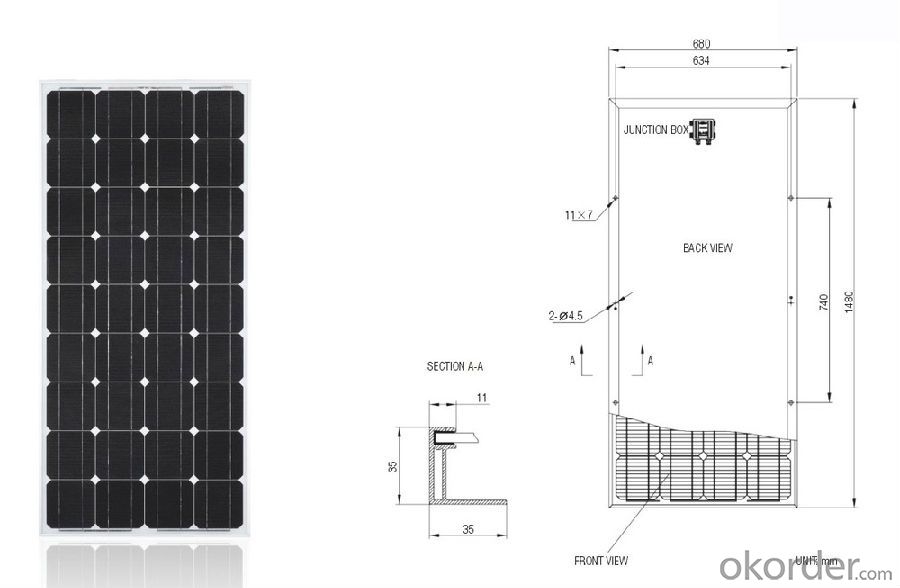
| ELECTRICAL CHARACTERISTICS | |||||||
| Model Number | KM(P)230 | KM(P)235 | KM(P)240 | KM(P)245 | KM(P)250 | ||
| Maximum Power as per STC | Pmax(W) | 230 | 235 | 240 | 245 | 250 | |
| Power Tolerance | % | ±3% | |||||
| Maximum Power Voltage | Vm(V) | 30.48 | 30.6 | 30.66 | 30.98 | 31.29 | |
| Maximum Power Current | Im(A) | 7.6 | 7.68 | 7.83 | 7.91 | 7.99 | |
| Open Circuit Voltage | Voc(V) | 36.6 | 36.72 | 36.84 | 37.38 | 37.5 | |
| Short Circuit Current | Isc(A) | 8.17 | 8.23 | 8.32 | 8.42 | 8.5 | |
| Maximum System Voltage | VDC | 1000 | |||||
| Cell Efficiency | % | 15.8 | 16.1 | 16.4 | 16.8 | 17.1 | |
| Module Efficiency | % | 14.1 | 14.4 | 14.7 | 15.0 | 15.3 | |
| Cells per Module | Pcs | 60 | |||||
| Cell Type | Polycrystalline silicon | ||||||
| Cell Size | mm | 156 x 156 | |||||
| Bypass Diodes | Pcs | 12Amp, 6 pcs | |||||
| Max. Series Fuse Rating | A | 15A | |||||
| Temperature coefficient of Isc | %/°C | 0.05 | |||||
| Temperature coefficient of Voc | %/°C | -0.35 | |||||
| Temperature coefficient of power | %/°C | -0.47 | |||||
| NOCT- Nominal operating cell temperature | °C | 47 ± 2 | |||||
| Operating Temperature | °C | -40 ~ +85 | |||||
| MECHANICAL CHARACTERISTICS | |||||||
| Dimensions | mm | 1650 x 990 x 50 | |||||
| Weight | Kg | 19.8 | |||||
| Type of Junction Box | TUV certified, IP65 | ||||||
| Cable Type, Diameter | TUV certified, 4mm2, 90 cm in length | ||||||
| Connector | compatible to Type 4 (MC4) | ||||||
| Tempered Glass | 3.2 mm, high transmission, low iron | ||||||
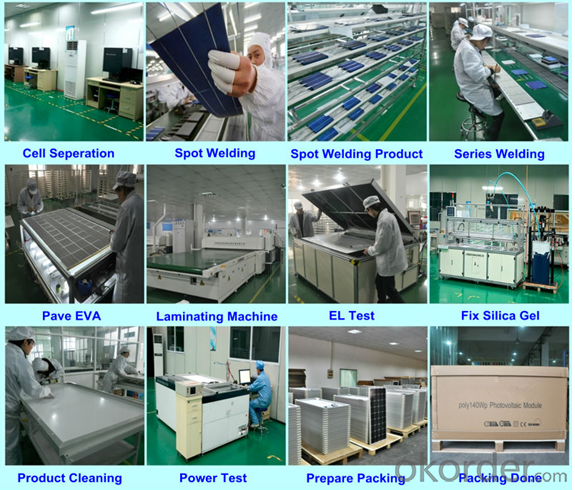 Packing
Packing
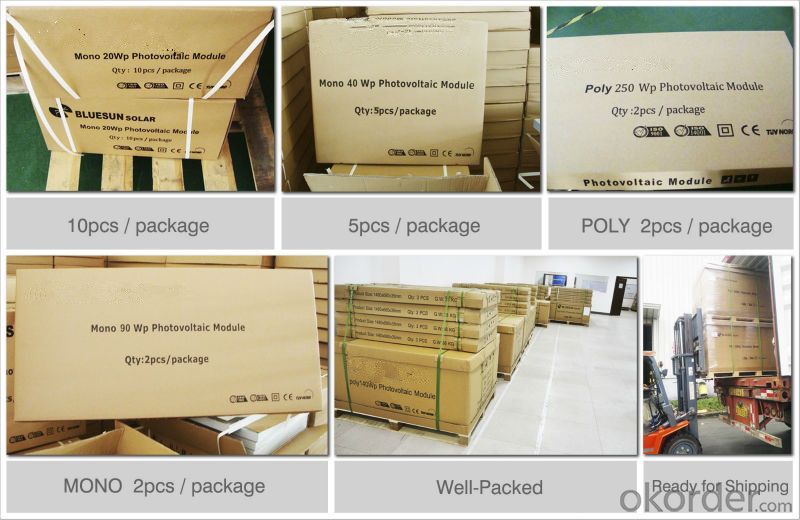
FAQ
1. What kind of Solar Cells does it have
---poly crystalline 156*156mm and 125*125mm or mono 125*125mm and 156*156mm
2. Is the front panel Glass or Plastic
---Tempered glass 3.2mm thickness or adjust to what you need, Light transmittance up to 95%.
3. Does it meet Europe Standards for Solar Energy
---This is TUV approval products, all the producing procedure apply TUV&UL.
4. What is the Efficiency level
--- Between 16-18.9% for solar cells.
5. What is the Nominal Voltage
--- 18v 20v 24v 36v 30v 48v , and so on, we can adjust to what you need.
6. What is the Warranty Period, How many years?
Power efficiency warranty:
---90% in 10 years; 80% in 25 years.
- Q: If we invest billions in green energy and put up thousands of square miles of black panels that give off radiant heat couldn't that significantly cause more warming, not to mention the energy required to even make them?
- I highly doubt it because they don't trap heat like carbon gas does in the atmosphere. Fossil fuels are literally destroying this planet and could eventually be it's demise it we don't accelerate it's elimination. If we could make the clock turn back to the early 20th century and focused on harnessing the sun and wind instead of burning fossil fuel as a means of transport and energy, we wouldn't even be talking about global warming or air pollutants that contribute to global health every year. The only thing the black panels to is create a darker surface but not much different than natural colors like dark dirt, dark green grass etc.
- Q: For my exam in science we are required to make a power point explaining why it would be good for our school to switch to solar. our complete handout given to us by our teacher is as follows:Power Point to include:. What you propose for alternative energy usea. Any thoughts on energy conservation...2. Why this is a good idea3. What information you would give the solar company (area of roof space your group determined to be useable for solar)In PowerPoint - include your quot;scriptof what you would be saying when the slide is up in the Notes section below the slideANY HELP WOULD BE GREATLY APPRICIATED!!THANK YOU SO SO MUCH,QH
- Create okorder /
- Q: im making an energy efficiant house for science class and i need to price the house. im putting solar pannels on the roof and would u please tell me how much they are per like 2 sq. feet of a pannel?
- Completely self-efficient and autonomous??? Forget it. Too expensive. It's only worth if you use like 8 lights (2-20w) about 4 hours a day, a fridge, a tv about 4 hours/day and basically nothing else or a few low consume stuff. Forget about microwaves, dryers, or other stuff. Too much watts. And that would cost you no less than 5000-6000$. You need panels (about 4 or 6 20w would suit maybe), 2 batteries (about 600Ah at least), inverter(500w/24v) and a regulator, lets say a 30A one. Just stick to normal energy supply. A single 20w panel may cost about 750$ at least.
- Q: I've run out of things to keep me entertained recently and as part of a larger project, I was curious if its possible to 'McGuyver' up a solar panel out of common materials?
- It okorder /
- Q: Can solar panels be installed on a condominium or apartment building?
- Yes, solar panels can be installed on a condominium or apartment building. However, it may require certain considerations such as the availability of suitable roof space, permissions from the building owners or management, and potential impact on other residents. Additionally, installation and maintenance costs may need to be shared among tenants or considered in the building's budget.
- Q: How do solar panels affect the property's sustainable development goals?
- Solar panels contribute to a property's sustainable development goals by promoting renewable energy generation. They reduce the property's reliance on fossil fuels, lower greenhouse gas emissions, and help combat climate change. Solar panels also provide a clean and abundant source of electricity, reducing the property's environmental impact and contributing to its long-term sustainability.
- Q: So I want to go completely solar. Do I need the connected solar panels alone for after sundown hours; Do I need something else in order to have energy to run my entire house throughout the night?In other words do solar panels store the energy for after sun-down or do I need other devices to store the energy?
- Solar okorder
- Q: How efficient are solar panels when it comes to turning light into energy? If it's not 00%, why? Can it be improved? Also, how do solar panels work, exactly.
- Solar panel refers to a panel designed to absorb sunlight as a source of energy for generating electicity or heating.solar module use sunlight to generate electicity through photovoltaic effect.The efficiency of solar panel is 5-8%,there are a few solar panels available that exceed 9% efficiency.
- Q: In nature, green leaves collect light and produce energy. Is this what they copied to make solar panels? If not how hard would it be to make artificial leaves that would power our homes?
- Solar panels were not made to copy leaves. Leaves have molecules that become excited when they are hit by light. They store this energy in ADP molecules and ATP molecules. This works great for biological processes, but until we learn how to use Adenosine Di/Triphosphate to transport energy, we are better off sticking with our solar panels. They produce electricity, which we know how to use.
- Q: it is just for a simple project, but i am looking for a cheap, low cost, around one to two volts solar panel regulator uld y'all please help?
- Solar cells shouldn't need a voltage regulator for simple projects like driving motors or powering CMOS electronic circuits. I would need to know a little more on your goals for the project to help. However, I will put a few links that may be helpful to solar cells and some voltage regulators. The first link is general solar cell info and includes manufacturer lists at the end. The second is a link to educational solar cell kits and cells that may be useful for you. The last one is Digi-Key which is good for finding components to make your own voltage regulator. Hope this helps with your project!!
Send your message to us
Non Roof Solar Panels 250w with TUV IEC MCS CEC IDCOL SONCAP Certificates
- Loading Port:
- Shanghai
- Payment Terms:
- TT OR LC
- Min Order Qty:
- 1000 watt
- Supply Capability:
- 100000000 watt/month
OKorder Service Pledge
OKorder Financial Service
Similar products
Hot products
Hot Searches
